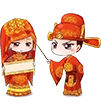春节的意义-春节的意义英文表述简短
- 影月章
- qiazhi
- 2024-01-20 19:39:01
1 春节的意义
春节作为传统的关键节日,誉为“华夏民族隆重 热闹 具特色的节日”。标志着农历新年的开始,也代表人们对新生活的期盼与祝福。除了给人们带来欢乐,春节也承载了许多深层的文化内涵和寓意。
春节代表对家庭和亲情的重视。在春节这个特殊的日子里,全家人会团聚在一起,共同庆祝。亲人相聚的喜悦让人们感受到家庭的温暖和亲情的关键性。不管是远离家乡的打工者还是国外工作的华人,他们都会尽能回到家乡与家人共度春节。这种团圆的场面让人们更加珍惜家庭的关键性,也倡导了传统的道德观念和家庭价值。
春节体现了对传统文化的尊重和传承。是个有着悠久历史文化的,春节作为关键的传统节日,充满了各种丰富多彩的传统习俗。从家人团聚到走亲访友 庆祝神灵到纳福祈福,每一个节日习俗都蕴含着深刻的文化内涵。比如年夜饭意味团圆和祈福,年初一的拜年习俗代表尊敬和祝福,过年期间的爆竹和舞龙舞狮则寓意着驱邪辟邪。这些传统习俗不仅展示了文化的精湛,亦是对文化传承的一种形式。
春节还代表新的开始和希望。农历新年的到来标志着寒冬过去,春天的脚步即将到来。是个注定充满新希望与新生活的时刻。不管是个人生活还是事业发展,人们都以全新的心态迎接新年,希望在新的一年里获得更加好的成长和收获。这种对新生活和希望的追求给人们带来了积极向上的力量,鼓励人们为自身的梦想努力奋斗。
春节的意义不仅限于表面的欢乐和喜庆,也是在于弘扬传统文化,传递着深刻的寓意和情感。象征家庭的团聚 对传统文化的尊重和传承,以及对新生活的期待和祝福。春节是*的传统节日,亦是文化的关键载体,在每个人的心中都占据着无比关键的地位。
春节作为传统节日的代表,具有丰富的文化内涵和深远的意义。不管是表达对家人的关怀和思念,还是传承传统文化的价值观念,春节都承载着人们对美好生活和幸福将来的向往。共同传承和弘扬这一千年的传统文化,让春节的意义在你的心中永不磨灭。

2 春节的意义英文表述简短
The Spring Festival, also known as Chinese New Year, holds significant cultural significance in Chinese society,It is a time of celebration, reunion, and reflection on the past year while looking forward to the future.
The Spring Festival officially marks the beginning of a new lunar year, according to the traditional Chinese calendar,It is the most important and widely celebrated holiday in China, and it usually falls between late January and mid-February,The festival lasts for 15 days and is filled with various customs and traditions.
One of the main meanings of the Spring Festival is the celebration of family and homecoming,It is unarguably the largest annual migration of humans in the world,Millions of people travel long distances to return to their hometowns and be with their loved ones during this special time,Family members gather together to share meals, exchange gifts, and honor their ancestors,This tradition fosters a strong sense of unity and belonging.
The Spring Festival is also a time for cultural and religious customs,People clean their houses thoroughly before the arrival of the new year, symbolizing the removal of bad luck and the making of a fresh start,Red couplets and lanterns are hung on doors and windows for good fortune and to ward off evil spirits,Firecrackers are set off to usher in the new year and drive away the old and negative energy,These customs are deeply rooted in the beliefs and traditions of the Chinese people and are passed down from generation to generation.
Another important aspect of the Spring Festival is the tradition of giving and receiving red envelopes,These red envelopes, known as "hongbao," are filled with money and are given by elders to children and younger relatives as a token of good luck and blessings for the new year,It symbolizes wealth, prosperity, and blessings in the coming year.
Food plays a significant role in the Spring Festival as well,Families gather to prepare and enjoy a variety of traditional dishes,Dumplings, fish, and rice cakes are commonly served, each with its own symbolic meaning,For example, eating dumplings symbolizes the passing of the old year and the welcoming of the new year, while fish represents abundance and surplus.
Moreover, the Spring Festival is a time for personal reflection and planning for the future,It is common to set new year resolutions and goals during this period,People reflect on their accomplishments and shortcomings of the past year and aspire to improve themselves in the coming year,The festival provides an opportunity to start afresh and strive for personal growth and success.
In conclusion, the Spring Festival is a time of immense cultural and emotional significance in Chinese society,It is a time for family, tradition, and renewal,Through vibrant customs, delicious food, and a deep sense of connection, the Spring Festival represents the celebration of a new beginning and the hope for a brighter future.








